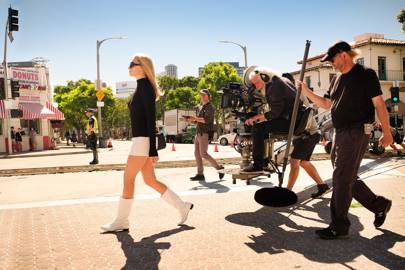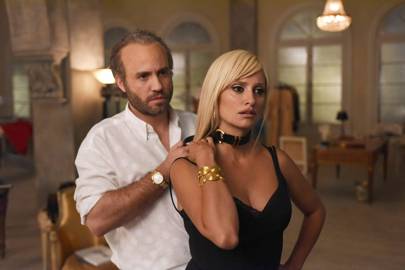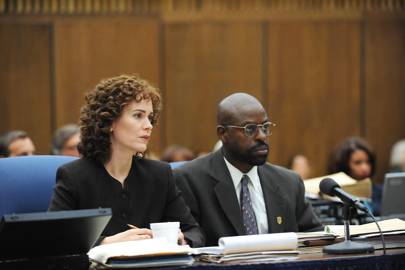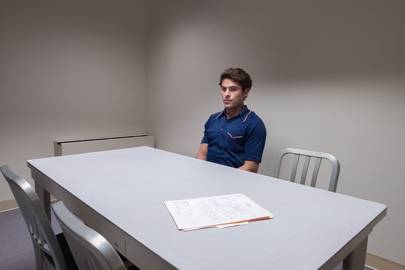An Investigation Into Our Obsession With True Crime
For the last year I’ve spent every working day trying to figure out where a high school kid was for an hour after school one day in 1999.” So began Serial, the 2014 podcast with a seemingly simple premise narrated by journalist and public radio host Sarah Koenig. A Maryland-set murder mystery, it told the true story of the disappearance of high schooler Hae Min Lee and the conviction of her ex-boyfriend, Adnan Syed, who was accused of strangling her. Through phone calls with Syed, conversations with their friends and clips from the original trial, Koenig unpicked the case week by week, casting doubt on the state’s key witnesses, scrutinising their timeline and raising more new questions than answers. It made for addictive listening, launched countless conspiracy theories and Reddit threads, and had on average 2.2 million downloads per episode, a podcasting record.

Margot Robbie as Sharon Tate in Once Upon A Time In Hollywood
Alamy
Key to Serial’s success was the scale of the story it told. On one hand, it was a relatable small-town drama that played out in an ordinary school, but the overarching themes resonated far beyond those cultural and geographical confines. Koenig described the narrative as “a Shakespearean mash-up [with] young lovers from different worlds thwarting their families, secret assignations, jealousy, suspicion and honour besmirched.” Underneath this epic universality, there was also a sense of urgency and timeliness, with the show touching on issues like racial bias, Islamophobia, the fallibility of investigative journalism and the flaws of the criminal justice system. It was a slice of suburban American life that reflected a national unease, exposing our increasingly shaky and uncertain relationship with the truth.
The Biggest Takeaways From The 'Once Upon A Time In Hollywood' Trailer
The podcast was part of a sea change within the true crime genre that provided highbrow alternatives to the grisly potboilers that have always loomed large in our public consciousness. After all, there were 16th century oil paintings depicting the murder of martyrs, crime pamphlets detailing gruesome attacks throughout the 17th century and salacious newspaper coverage of Jack the Ripper in the 1880s. Then came prestige-laden literature in the form of Truman Capote’s In Cold Blood and Norman Mailer’s The Executioner’s Song, and with the advent of TV a slew of documentaries chronicling everything from the trials of Ted Bundy and OJ Simpson to the killing of child beauty queen JonBenét Ramsey.
In this oversaturated marketplace, what set Serial apart was that it offered the adrenaline rush of its predecessors but remained at its heart an intellectual exercise and, crucially, an unresolved one. Other programmes had also identified this appetite for thoughtful analysis over sensationalism. In 2015, HBO’s six-part documentary The Jinx examined the cases against New York real estate heir Robert Durst. Linked to two murders and a disappearance, Durst was acquitted of one and awaiting trial for another when he spoke to filmmaker Andrew Jarecki. After several candid interviews and an accidental confession, Durst was arrested just hours before the finale aired.
Later that year Netflix dropped Making a Murderer, the story of Steven Avery who served 18 years in prison for a wrongful conviction, was later exonerated and after filing a civil lawsuit against Manitowoc County, Wisconsin, was arrested again under separate charges. The show became embedded in popular culture and led to a White House petition demanding Avery’s pardon that gained over 500,000 signatures. The power of true crime programming, to expose perceived injustices and shape ongoing investigations, was undeniable.
There was a rush to meet the audience demand for more cold cases. The Australian podcast The Teacher’s Pet studied the disappearance of mother-of-two Lynette Dawson; Someone Knows Something reviewed different unsolved crimes each season; and Dirty John scrutinised the life of conman John Meehan (it was later adapted into a Netflix series starring Eric Bana). There was no shortage of true crime documentaries on the streaming platform either – from The Keepers, about the murder of nun Sister Cathy Cesnik who suspected a priest at her school was guilty of child abuse, to The Confession Tapes, which looks at possible false confessions that led to convictions.

Edgar Ramirez and Penelope Cruz as Gianni and Donatella Versace in The Assassination of Gianni Versace: American Crime Story
Alamy
While the ability to binge watch these shows online formed part of their appeal, primetime TV proved an equally effective platform for true crime. Ryan Murphy’s American Crime Story: The People v. OJ Simpson delved into the trial of the former NFL star, set against the backdrop of fame, racism and police corruption in LA in the 1990s. Its release coincided with a new factual miniseries on the subject, OJ: Made in America, which won the 2017 Oscar for Best Documentary. The following year, Murphy’s The Assassination of Gianni Versace told the story of the designer’s murder in reverse chronological order, focusing on the motivations of serial killer Andrew Cunanan.
6 TV Dramas Worth Staying In For This Summer
One criticism they all faced, and one the genre often contends with, is the marginalisation of victims and the moral dilemma that comes with dredging up old memories that could upset their families. The Oscar-nominated director Amy Berg was keen to address this issue in her recent four-part HBO documentary The Case Against Adnan Syed. A reappraisal of the investigation first discussed on Serial, it examines fresh evidence but also seeks to put Lee at the centre through the use of animated vignettes and readings from her diary. “In some ways it was a risky choice,” she tells Vogue. “But I wanted people to get a better sense of who Hae was and hear about her life, her friends and her family. The final product had to be sensitive to Hae.”

The People Vs OJ Simpson: American Crime Story revisited the trial that gripped the world in the '90s
Alamy
Joe Berlinger had similar concerns. The director of Extremely Wicked, Shockingly Evil and Vile – a new crime thriller about the life of Ted Bundy starring Zac Efron – Berlinger wanted to retell the story from the perspective of Bundy’s girlfriend Elizabeth Kloepfer (also known as Liz Kendall). Played by Lily Collins, Kendall fell victim to Bundy’s manipulation and refused to believe he was guilty until the evidence became insurmountable. “I wanted the audience to have the same experience as Liz,” Berlinger explains to Vogue. “Bundy duped her like he duped the media who made him a perverse star, like he duped the justice system that gave him such latitude that he was able to escape twice and represent himself at trial even though he was just a law student. He was allowed to prance around because he was a good-looking white guy in the patriarchal 1970s. If that had been a person of colour, you can bet he would’ve spent the entire trial in an orange jumpsuit and chains.”
The director explores this further in his Netflix documentary Conversations with a Killer: The Ted Bundy Tapes. After it landed on the streaming service back in January, Berlinger remembers being on a flight back from Sundance where Extremely Wicked, Shockingly Evil and Vile had premiered. “I was walking to my seat from the back of the plane and every third person I saw had the documentary playing on their laptops,” he says. “Even I was surprised by how popular it was.”

Zac Efron as serial killer Ted Bundy in Extremely Wicked, Shockingly Evil And Vile
Wicked Nevada
So, how does he explain our compulsive consumption of true crime? “It’s something people have always been obsessed with and I think there will be an endless appetite for it,” he replies. In his view, we haven’t reached peak true crime – we’ve simply reached peak content. “There’s a lot of true crime out there at the moment because there’s more production as new players like Netflix, Amazon, Hulu, Apple and Facebook figure out what works. It’s a popular genre and so of course it’s going to incrementally benefit.” Alongside Berg and Berlinger’s projects, 2019 has already seen a controversial new documentary series about Madeleine McCann and two films about Charles Manson (Charlie Says and The Haunting of Sharon Tate). Still to come is Ava DuVernay’s Netflix miniseries When They See Us, about the Central Park Five and Quentin Tarantino’s Manson-era Once Upon a Time in Hollywood.
The Case Against Adnan Syed Is The Groundbreaking Documentary That Serial Fans Have Been Waiting For
While stories about prominent figures like Bundy, Simpson and Manson indulge our voyeuristic impulses and offer insights into troubled minds, the resurgent interest in unsolved cases suggests a different motive. “We like to put pieces together in our mind,” says Berg. “I think it’s the search for justice that drives most people to unpick cases like Adnan’s and when things don’t line up, when the witness changes their story six times, when there’s no physical evidence, we feel helpless as people who are dependent on the criminal justice system and need to discover the truth.” In an age of public disillusionment with politics, police, the press and the legal process, true crime allows us to take up the mantle for ourselves and try to find the clues that others have missed. Those observations could then become the catalyst for campaigns, petitions, reexaminations and retrials. “Otherwise we’ll always wonder,” she adds. “What if they missed something?”


0 Коментарии